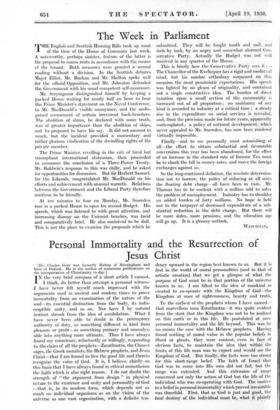The Week in Parliament
THE English and Scottish Housing Bills took up most of the time of the House of Commons last week. A noteworthy, perhaps sinister, feature of the latter is the proposal to assess rents in accordance with the means of the tenant. Both measures were granted . a second reading without a division. In the Scottish debates Major Elliot, Mr. Buchan and Mr. Skelton spoke well for the official Opposition, and Mr. Johnston defended the Government with his usual competent self-assurance.
Mr. Scrymgeour distinguished himself by keeping a packed House waiting for nearly half an hour to hear the Prime Minister's statement on the Naval Conference, to Mr. MacDonald's visible annoyance, and the undis- guised amusement of certain irreverent back-benchers. The abolition of slums, he declared with some truth, was of greater importance than the abolition of ships, and he proposed to have his say. It did not amount to much, but the incident provided a momentary and rather glorious vindication of the dwindling rights of the .private member.
The Prime Minister, revelling in the role of tired but triumphant international statesman, then proceeded to announce the conclusion of a Three-Power Treaty. Mr. Baldwin's response to this was chilly, and he asked for opportunities for discussion. But Sir Herbert Samuel, for the Liberals, congratulated Mr. MacDonald on his efforts and achievement with unusual warmth. Relations between the Government and the Liberal Party therefore continue to be friendly.
At ten minutes to four on Monday, Mr. Snowden rose in a packed House to open his second Budget. His speech, which was listened to with great attention, and increasing dismay on the Unionist benches, was lucid and comparatively brief. He also contrived to be dull. This is not the place to examine the proposals which he submitted. , They will be fought tooth and nail, , and inch by inch, by an angry and somewhat alarmed Con- servative Party. Actually the Budget was not well received in any quarter of the House.
This is briefly _how. the Conservative Party sees it :--- The Chancellor of the Exchequer has a rigid and inedimval mind, but his sombre orthodoxy surpassed on this occasion the most pessimistic expectations. His speech was lighted by no gleam of originality, and contained not a single constructive idea. The burden of, direct taxation upon a small section of the community is increased out of all proportion ; no assistance of . any kind is accorded to industry at a critical time ; a steady • rise in the expenditure on social services is revealed, and, from the provision made for future years, apparently contemplated ; a policy of national development, which never appealed to Mr. Snowden, has now been rendered virtually impossible.
Finally—and to me personally most astonishing of all—the effort to obtain substantial and favourable conversions this year has . been abandoned, for the effect of an increase in the standard rate of Income. Tax. must be to check the fall in Money-rates, and move the foreign exchanges against us.
So the long-continued deflation, the resolute determina- tion not to borrow, the policy of reducing at all costs the floating debt charge—all have been in Vain., Mr. Thomas has to be content with a million odd to solve the problem of unemployment. Industry has to shoulder an added burden of forty millions. No ,hope is , held out to the taxpayer of decreased expenditure of a sub- stantial reduction in the debt charge. But there, will be more doles, more pensions, and the education age will go up. It is a gloomy outlook.
WATCIIMAN.










































 Previous page
Previous page